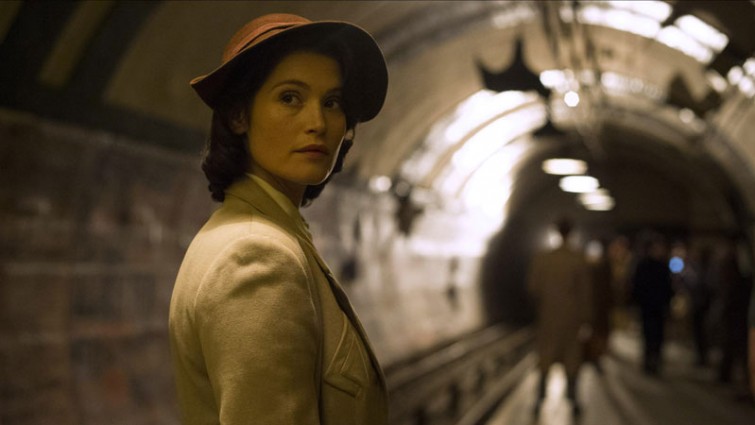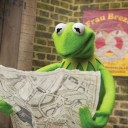

Member review

Their Finest
During World War Two, a young woman discovers she has an inspiring way with words when she is taken on as a scriptwriter for propaganda...
Certificate
Duration117 mins
Review by
-
 Rory, 17
Rory, 17 - 5 reviews
A Theme-Driven Russian Doll of a Historical Narrative
I don’t think I had heard of Their Finest before watching it. I say I don’t think, as its very easy these days to confuse the surplus of British historical films, and I find it quite difficult to keep track of them. Their Finest doesn’t help this by having quite a generic poster, too. What’s probably most attention grabbing, other than Bill Nighy of course, is the clapperboard put straight in the centre, because this is a film about filmmaking! And just like Super 8 and Singin’ in the Rain, if you want to watch the films they’ve made by the end of it, you know somebody’s done their job right.
Their Finest troubles Gemma Arterton’s character, Welsh Catrin, with the task of creating a stirring piece of cinematic propaganda to lift the public after the morale-draining retreat in Dunkirk during World War Two. Working with Sam Claflin’s screenwriter Tom and Bill Nighy’s actor Ambrose, we see the struggles of both stringing together a coherent film and living in Blitz-Stricken London merge together as Tom and Catrin grow closer together as collaborators and lovers. I think that the film could do better with titling itself Their Finest Hour and a Half, corresponding with the book that the film is based from, and expressing what the film was about. The plot plays out really well for the most part, and I felt myself really engaged with these characters. I often was left laughing at the whit of some of the back-and-fourth sequences in the Ministry of Information, and especially at the characters made for the film within the film. Similarly, when the film chose to tackle the more serious subjects of the war and Catrin’s personal life, I was invested enough to share their emotion. There were several quite weird plot developments, though, that I felt didn’t have enough build up or were handled quite quickly. Towards the end, the film seemed to go in all sorts of directions, that left me a bit taken-aback at the time, but the conclusion made some sense of these with its use of themes spread throughout the film. I am a huge fan of the film within the film, and how it really feels like it could have been a real film of the period. What makes this even better, is the connections in theme between this film, and the narrative generally, which was handled splendidly well in my opinion.
One of the themes that weave between the film and the narrative is a feminist one, and the importance of representation in media. Their Finest, written, directed, starring, based on the book of and scored by women does not shy away from showing how Catrin feeds themes of feminism into her own narrative, generally against the wishes of her male co-filmmakers. The effect is especially powerful, and a real importance is given to their efforts to make this film, in both raising the morale of the public, and inspiring women, which was very important during the Second World War. This gives the film, then a very meta quality, if it didn’t already have one, and I think adds another layer to a great work of narrative. I think this justifies the film being fiction (not that that was a choice), as it often feels like it is presented as a true story, and it makes the emotions a lot more raw.
Visually, I thought the film looked wonderful. I enjoyed seeing the representations of the film inside Catrin’s head, as she imagines what it might look like. The muted palate rather than make it seem dreary, give it both the dream-like feel, and an authentic one. The film was enjoyable to look at in other places, but perhaps not revolutionary in the meaning behind its cinematography.
The performances of the main cast really brought the film together, and I they all felt believable. I often find Bill Nighy as a standout performer, and I can’t say that this film was any different. He really does feel like an actor here, in his mannerisms and reactions, and late into the film, I think this really plays out well for emotions, where you might not perhaps expect them.
The score was charming, as you might expect from a British historical drama, along with strings and piano and slow plinks and plonks. Rachel Portman’s score reminds me somewhat of the “Thai Good Stories” advert’s score in trying to draw emotion, and its quite musically similar. At parts it adopted the emotion of the period resembling themes, I think, of Edward Elgar, in a similar way to Dunkirk’s score. Generally a good listen, but perhaps, also, not too ground-breaking or memorable.
I really loved this film; I think it had lots of good elements of film form working in its favour, and its plot held a lot of important themes presented through both sad and happy emotions. I wouldn’t say it’s perfect however, as the plot did seem a bit confusingly unconnected at points. Towards the end, especially, the story dragged on a bit too long, I think. Audience-wise, I would have a hard time placing this film; it has the makings of a family film, but then some very mature themes that are out of place for that. I would probably recommend this film to older families of perhaps teens, looking for a fun yet emotional evening film.